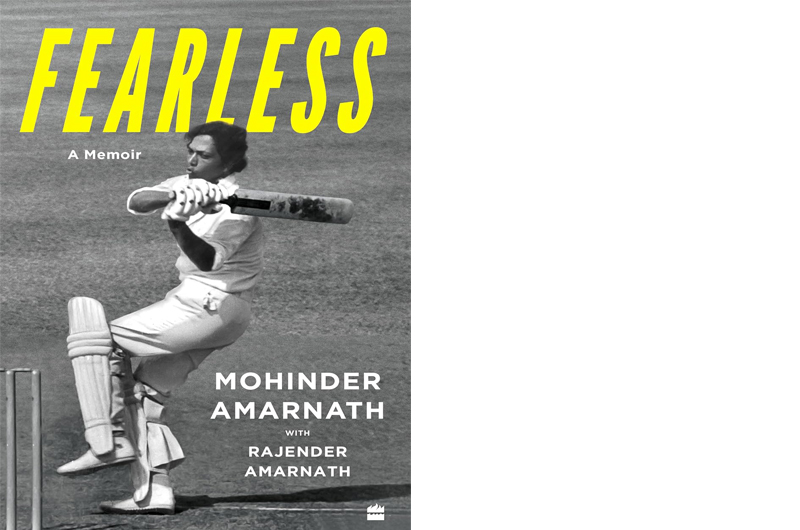FEARLESS
Author: Mohinder Amarnath with Rajender Amarnath
Publisher: Harper Collins
Pages: 454
Price: Rs 799
It’s been a long time coming. Thirty-five years after he played his last international for India, Mohinder Amarnath has come out with his autobiography and the title is apt for fearlessness was a typical characteristic of the man when he was at the crease. Little wonder then that Vivian Richards hailed him in 1983 as “the best player of fast bowling in the world”. For an Indian to be hailed in such glowing terms was unthinkable as this mode of bowling has traditionally been the biggest bugbear for Indian cricket.
And yet a batsman of Amarnath’s calibre, skill, guts and an impressive record to boot, was kept out of the Indian team repeatedly, was in and out of the squad many times, and at one time was not considered for more than three years even as the Indian team were going around the international circuit without any conspicuous success. The crying need was for a batsman who could not only just face pace bowling squarely but also score runs handsomely off it. But while Amarnath played Ranji and Duleep matches, batsmen with considerably limited skills and far less courage were donning the India cap. This is the kind of irony that has retarded the progress of Indian cricket.
Indeed, Amarnath’s career has to be one of the most fascinating and enduring tales in the history of Indian cricket. It had everything that would be ideal for a hit film script – ups and downs, many heroic triumphs and a few outright disasters, numerous comebacks that made him the Muhammad Ali of the game in India and, at the centre of it all, a personality almost as colourful as his father (Lala Amarnath). He generally preferred to suffer in silence, but when the need arose, he too was not afraid to court controversy. Like Lala, he was always news, on and off the field. He certainly was a worthy son to a great cricketer, in more ways than one.
All this has been related fairly dramatically in the extremely readable autobiography. He is modest about his successes but talks about the controversies with telling effect. He makes it clear that he was kept out at various times because of non-cricketing reasons and points out to his record which automatically should have kept him in the Indian team on a more regular basis. Amarnath’s international career lasted 20 years, the second longest after Sachin Tendulkar, but in that time he played just 69 Tests and 85 ODIs. This hardly does justice to such a doughty warrior.
The book is written in conventional style, starting with his early days in Patiala, how he naturally took to cricket with his father playing a major role in encouraging both Mohinder and elder brother Surinder and how he went as a member of the Indian schools team to England in 1967 – his first real cricketing education. He writes with feeling about his Test debut against Australia in Chennai in December 1969 but then played his next Test only on the tour of New Zealand and West Indies in early 1976.
The first real innings that underscored his doughtiness was his marathon 85 against West Indies at Port of Spain which played a major role in India’s historic win. That knock drove home the point that the bigger the stage the better Amarnath performed. Few Indian batsmen can boast of a difference of more than 21 runs between his home average (30.44) and the average overseas (51.86). Nine of his eleven Test hundreds were compiled away from home. When the going was tough in alien conditions, the team knew it could depend on this courageous warrior.
Amarnath’s peak period has been well chronicled. From December 1982 to June 1983 he could do no wrong. Brought back for the tour of Pakistan after three years in the wilderness Amarnath was dedication and determination personified. While the vast majority of his teammates floundered against Imran Khan and company, Amarnath got 584 runs with three hundreds. Even more meritorious was his feat on the tour of the West Indies that followed. Against the fearsome pace quartet of Andy Roberts, Michael Holding, Joel Garner and Malcolm Marshall, he amassed 598 runs with two hundreds and four fifties. And then came the crowning glory when as vice-captain of the Indian team that most unexpectedly won the World Cup in England in June, he was awarded the Man of the Match in both the semifinal and the final for his all-round exploits.
Despite a horrendous run in the return Test series against West Indies at home – he scored just one run in six innings – Amarnath thereafter remained a regular member of the Test team till 1988 but despite doing well in ODIs he was in and out of the limited overs squad, including not making the team for the 1987 World Cup at home. Amarnath recounts his disappointment in no uncertain terms, coming down heavily on those he felt were responsible. This was the time he described the selectors as “a bunch of jokers”, a phrase that has become part of cricketing folklore. Actually in the course of the narrative Amarnath also doesn’t spare a few of his teammates who he feels were wrong. But the bitterness has been kept down to a minimum when for a man like him who has been treated so unfairly he could so easily have gone overboard.
(Reviewed by Partab Ramchand, veteran sports writer who spent his career working for The Indian Express and The Telegraph and Sportsworld. He lives in Chennai.)



 from Webdoux
from Webdoux